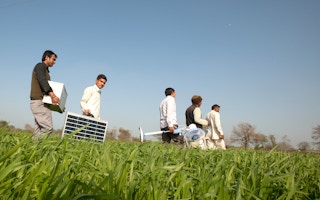Cities must lead access to clean, affordable and uninterrupted energy since urban growth and living standards intensify per capita energy use in developing countries, says a new report.
Released on 7 September by the World Resource Institute (WRI), the report highlights fundamental energy challenges facing cities in the global South. It also noted that poor urban households often spend 14 – 22 per cent of their incomes on energy.
The study’s lead author, Michael Westphal of WRI’s Ross Centre for Sustainable Cities, says that cities can implement three practical solutions to meet the needs of the urban under-served while charting development models that slow carbon emissions — shift to cleaner cooking fuels such as liquefied petroleum gas (LPG), install renewable energy systems like solar panels and introduce building energy efficiency codes and appliance standards.
“
City governments need to lead by supporting energy efficiency initiatives and regulations.
David Satterthwaite, International Institute for Environment and Development
“Consumer finance models that address the costs of clean cooking have shown promise in Africa,” says Westphal. “In Uganda, consumers use mobile phones to access LPG stoves on a pay-as-you-go basis and Kenya has a rent-to-own programme for improved charcoal stoves.”
Cities, such as Cape Town (South Africa) and Bangalore (India), have enacted net metering where solar panel owners can sell excess power back to the grid.
“They are not just consumers but ‘prosumers’, and this income generation can be important for scaling up solar. There has been a precipitous decline in the cost of solar panels — 90 per cent in the last five years. Moreover, there has been a proliferation of business and finance models for solar,” Westphal tells SciDev.Net.
The report points to barriers — including institutional capacity, finance and policy — to energy security in developing countries.
“City governments need to lead by supporting energy efficiency initiatives and regulations, making municipal land available for renewable energy projects, and working with civil society organisations to engage with local communities,” says study co-author David Satterthwaite of the International Institute for Environment and Development.
“National governments need to adopt complementary policies like fossil fuel subsidy reforms and renewable energy policies like feed-in tariffs and net or gross metering,” Satterthwaite tells SciDev.Net.
The study calculates that the power generated by tripling the current installed capacity of solar panels across 60 countries would reduce annual carbon dioxide emissions by 108 million metric tonnes.
| Power Plant Type | Cost ($/kW-hr) |
| Coal | $0.11-0.12 |
| Natural Gas | $0.053-0.11 |
| Nuclear | $0.096 |
| Wind | $0.044-0.20 |
| Solar PV | $0.058 |
| Solar Thermal | $0.184 |
| Geothermal | $0.05 |
| Biomass | $0.098 |
| Hydro | $0.064 |
A report released this year by the Climate Council Australia (CCA) shows that populous cities, booming urban centres and rural townships could collectively slash energy emissions by up to 70 per cent. “For the past five years, investment in renewables has been roughly double the level of investment in fossil fuels,” says Amanda McKenzie, head of the CCA.
Renewable energy now beats fossil fuels on any measure — environment, affordability and health. It improves the security of electricity supply because it’s home-grown and not dependent on imports. And because renewables are distributed, they also improve reliability by reducing the system’s vulnerability to the failure of any single generator”, says Vaness Petrie, CEO of Beyond Zero Emissions, Australia, a climate solutions think-tank.
This piece was produced by SciDev.Net’s Asia & Pacific desk.

















